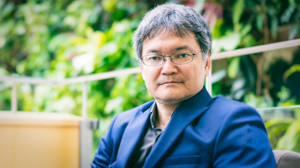
 Dr. Jorge Yamamoto
Dr. Jorge Yamamoto
Dr. Jorge Yamamoto has travelled all over the world in the pursuit of understanding happiness.
A professor at the Pontifical Catholic University of Peru, Dr. Yamamoto’s research probes why countries with the most wealth tend to be the least content, while countries with comparatively less – particularly in Latin America – report much higher rates of happiness.
Over the years, Yamamoto’s work has taken him to countries on four continents including Ethiopia, Argentina, Thailand, and now Canada, where Dr. Yamamoto travelled for the first time to present to a class of University of Guelph-Humber students, meet with the university’s Agora Fellows, and discuss his findings on the social psychology of happiness.
Where did your research on happiness start?
I started studying why the remote villages of the Andes and the Amazonian areas are poor but very happy. Economists in the late ‘90s found that rich countries were high on depression and anxiety but very low on subjective well-being. The poorest countries were also unhappy, but some middle-income countries like Peru, Ethiopia, Bangladesh and Thailand were high on happiness. We made a mathematical model to understand those reasons why people are poor but happy.
What sort of conclusions did you find?
The organ of happiness is the brain. The question is then, what is the wiring for happiness in the brain? And this wiring evolved or mutated 190,000 years ago, in the ancient environment. We found that the gap between this environment and modern society is the gap of unhappiness. But there are some modern societies that still live a lifestyle connected to the ancient way of living. This is the main reason why Latin America and Caribbean and other developing countries are so happy. So what were the characteristics of this ancient environment where the brain evolves? First, strong networks of friends and family, and the presence of real problems that are solved alongside friends and family. Neurologically, when you have problems, human beings have a substance called cortisol, which is related to the production of oxytocin, which makes you look for the support of others. If you find that support, you reduce cortisol and produce opioids. But what happens if your culture says that when you have problems, you should be left alone? Or the pressure is that you should be like Superman or Captain America, that you solve your problems by yourself? You have stress, and the stress increases. You are going to compensate with many other things, but you don’t attack the core of the happiness brain system.
When you were travelling to all these remote places, did you find people defined happiness differently?
When we went to remote communities, the first problem was to translate the happiness question, because they don’t have this question. The Andean and Amazonian remote villagers don’t ask about happiness, because they are naturally happy. In their native languages, there is no word for stress or unhappiness, just for physical tiredness. They just need to have food and to have a happy family. We speak a lot about equilibrium of work and life in modern society – this is not a problem there because the family is a unit of production, and they are together all the time, and they don’t get bored. But as you get close to the big cities, the goals are increased. You don’t just need to have a family, you need to have a job, and therefore some kind of degree, and a car – but not just any car – and the list starts to grow. Some achieve more than others, and this creates growing dissatisfaction at the community level, and it creates envy and conflict and inequity.
How can we use your research to live happier lives?
One universal takeaway isn’t possible, but it could be illustrative to understand how other societies live so well with very few material resources, and how the brain reacts negatively to autonomy, ultra competitiveness and loneliness, which seem to be major values of Western societies. Material resources are good, but when money turns into a goal of life or a value, that’s lethal for well-being and for society as well.

